Hartman's Nursing Assistant Care the Basics 4th Edition Chapter 4
It is a condition in which all of the body systems are working at their best
keyword: balanced
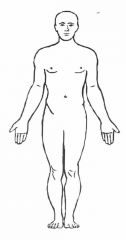
The front of the body or body part
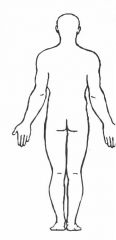
The back of the body or body part
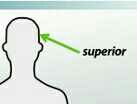
Toward the head
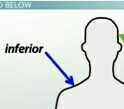
Away from the head
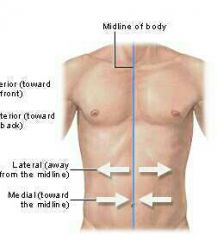
Toward the midline of the body
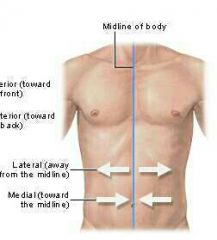
To the side away from the midline of the body

Closer to the Torso

Farther away from the Torso
What is the largest organ and system of the body
What kind of organ is the skin
In Darker complexions what changes should you look for in the tissue or skin
An orange peel look or purplish Hue and extremely dry crust like areas that might be covering a tissue break
How many bones are in the human body
Muscles provide movement of body parts to maintain posture and produce heat
When the muscle waste away decreases in size and becomes weak
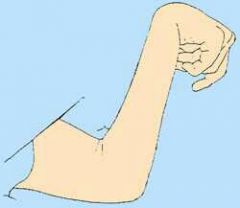
Develops when the muscle or tendon shortens becomes inflexible and freezes in position
A general term for inflammation or swelling of the joints it is an autoimmune disease
Autoimmune illnesses causes the body's immune system to attack normal tissue in the body
Can affect people of all ages joints become red, swollen and very painful
Called degenerative joint disease or degenerative arthritis often affects older people
Causes bones to become porous and brittle it occurs more commonly in women after menopause
What causes a hip fracture
It is caused by an accident or by osteoporosis
When dressing a patient that has had a hip replacement what is one important guideline that you should remember
Dress the weaker side first
The resident is able to support some body weight on one or both legs
The resident is unable to touch the floor or support any weight on one or both legs
Means both legs can bear a hundred percent of the body weight on a step
What are some guidelines for hip replacement
1 dress the weaker side first
2 Follow the care plan exactly even if the resident wants to do more
3 crossing the resident not to sit with her legs crossed the hip cannot be bent or flexed more than 90 degrees it could not be turned inward or outward
4 when transferring from bed use a pillow between the thighs to keep a leg separate
5 with chair and toilet transfers the operative leg should be straight into the stronger leg should stay in first then the foot of the affected leg can be brought back to the walking position
What can be used to help control blood clots
Apply a special stocking as ordered one type is a compression stocking it is plastic Air filled sleeve like device that is applied to the legs and hooked to a machine
What does the nervous system do
It is the control center of the body it controls and coordinates all body functions the nervous system also senses and interprets information from outside the human body works together with the skin organ
What are the two main parts of the nervous system
1 the central nervous system
2 peripheral nervous system
What happens during a stroke
Occurs when blood supply to part of the brain is blocked or a blood vessel leaks or ruptures within the brain brain cells begin to die
Paralysis on one side of the body
Trouble communicating thoughts through speech or writing
What are some guidelines for caring for a patient who have had a stroke
1 Residents of paralysis weakness or loss of movement will usually have physical or occupational therapy
2 being confused or having memory loss are upsetting people often cry for no apparent reason after suffering a stroke
3 when helping with transfers or walking always use a gait belt for safety , stand on the weaker side and support the weaker side lead with the stronger side
4 dress the weaker side first
5 phra se questions in a yes or no form
What is Parkinson's Disease and what does it cause
Parkinson's disease is a progressive incurable disease. Parkinson's causes a section of the brain to d egenerate and causes stooped posture and shuffling gait or walk it can also cause pill rolling
What is multiple sclerosis
Multiple sclerosis is a progressive disease that affects the central nervous system
What are some guidelines for caring with for a patient with multiple sclerosis
1 Give the resident plenty of time to communicate
2 prevent Falls which may be due to a lack of coordination fatigue or vision problems
What do head injuries cause
Head injuries can cause permanent brain damage, they may have intellectual disability personalality changes, breathing problems, seizures, coma, memory loss, loss of consciousness paresis and paralysis
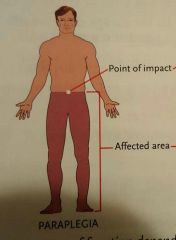
Loss of function of the lower body and legs

Loss of function in the legs, trunk and Arms
What are the body's major sense organs
Ears, eyes, nose, tongue and skin. they are all part of the central nervous system

A cataract develops the lens of the eye which is normally clear becomes cloudy this prevents light from entering the eye. vision blurs and dims initially vision is eventually lost entirely
It is treated with eye drops and other medication and sometimes with surgery
What does the circulatory system do
The circulatory system supplies, food, oxygen and hormones to cells. IT also s upplies the body with infection-fighting blood cells . the circulatory system also removes waste products from cells and h elps control body temperature
High blood pressure. a measurement of 140 / 90 or higher is considered hypertension
Chest pain, pressure or discomfort
What is extremely important for patients that suffer angina pectoris
Rest! rest reduces the need for oxygen and help the blood flow return to normal often within 3 to 15 minutes
What type of diet should a patient be on who have had a myocardial infraction or heart attack
Residents may be on a diet that is low in fat and cholesterol and are low in sodium and courage residents to follow special diets
What is used to help remove excess fluids with congestive heart failure
Medications help remove excess fluids this means more trips to the bathroom
The body taking in oxygen and removing carbon dioxide involves breathing in
Chronic obstructive pulmonary disease ( COPD)
Causes trouble with breathing especially in getting air out of the lungs
How should a patient with COPD sit
It helps residents with COPD to sit upright and lean forward slightly
What kind of breathing should you encourage with residents with COPD
Encourage pursed lip breathing pursed lip breathing involves inhaling slowly through the nose and exhaling slowly through pursed lips as if about to whistle
What are the two important functions of the urinary system
The urinary system eliminates waste products created by the cells urinary system also maintains the water balance in the body
What are four things an NA needs to remember when treating UTIs
1 UTIs are more common in women
2 encourage residents to wipe from front to back after elimination
3 encourage plenty of fluids
4 taking showers rather than baths help prevent UTIs
What is another term for the gastrointestinal system and what is it's function
The digestive system: the two functions of this system is digestion and elimination
The process of preparing food physically and chemically so that it can be absorbed into the cells
The process of expelling solid waste
What are normal signs of aging in the gastrointestinal system
1 decreased saliva production
2 dull sense of taste
3 absorption of vitamins and minerals decreases
4 the process of digestion takes longer
5 body waste moves more slowly through the intestines
The inability to eliminate stool or the infrequent difficult and often painful elimination of hard dry stool
Enlarged veins in the rectum
The frequent elimination of liquid or semi-liquid feces
Gastro esophageal reflux disease ( GERD)
A chronic condition in which liquid contents of the stomach back up into the esophagus
What are two things that can help with GERD
1 serving the evening meal three to four hours before bedtime
2 serving the largest meal of the day at lunchtime and several small meals throughout the day
An artificial opening in the abdomen
Is made up of glands in different areas of the body
keyword pancreas and diabetes
What are three things that one should observe about the endocrine system that is related to diabetes
1 loss of appetite or increased appetite
2 increased thirst
3 frequent urination or any change in the urine output
What are the two types of diabetes
Type 1: usually is diagnosed in children and young adults
Type 2: most common form of diabetes in adults
What are two important guidelines for diabetics
1 proper foot care give foot care as directed, diabetics have poor circulation
2 encourage residents to wear comfortable well-fitting leather shoes that do not hurt their feet ,cotton socks are best to absorb sweat
What are the normal signs of aging in the reproductive system for males
Sperm production decreases, p rostate gland enlarges which can interfere with urination
What are the normal signs of aging in the reproductive system for females
Menstration ends, decrease in estrogen, and vaginal walls become drier and thinner
What does the immune system do
The immune system protect the body from disease causing bacteria, viruses, and organisms
Protects the body from disease in general
Protects against a particular disease that is invading the body at a given time
Is a clear yellowish fluid that carries disease-fighting cells called lymphocytes
What are 2 guidelines for r esidents with HIV or Aids
1 a person has nausea or vomiting should eat small frequent meals
2 numbness, tingling and pain in the feet and legs is usually treated with medication, wearing loose soft slippers may be helpful. if blankets cause pain use a bed cradle
A group of abnormally growing cells
Considered non-cancerous
keyword : be nice
Cancerous tumor
keyword: mean
What are three treatments of cancer that may be combined
Surgery, chemotherapy, radiation
What is one thing NA with residents with cancer or a terminal illness need to remember
Respect the needs of the resident, be honest and never say everything will be ok, be sensitive and remember that residents may not want to talk about it
What are three guidelines for residents with cancer
1 give back rubs for comfort and increase circulation
2 use lotion on dry or delicate skin but do not apply lotion to areas receiving radiation therapy
3 help residents brush and floss teeth regularly . Do not use commercial mouthwash or any mouthwash with alcohol base
Hartman's Nursing Assistant Care the Basics 4th Edition Chapter 4
Source: https://www.cram.com/flashcards/heartmans-nursing-assistant-care-the-basics-chapter-4-7429990
0 Response to "Hartman's Nursing Assistant Care the Basics 4th Edition Chapter 4"
Post a Comment